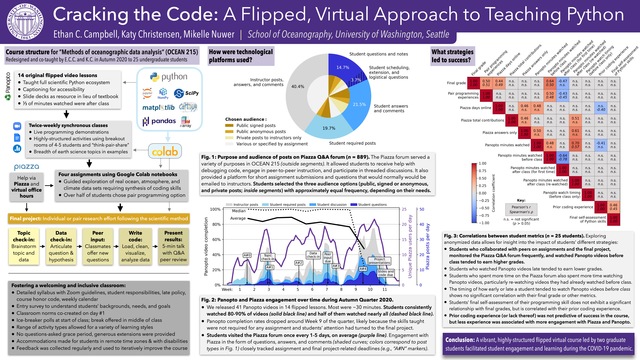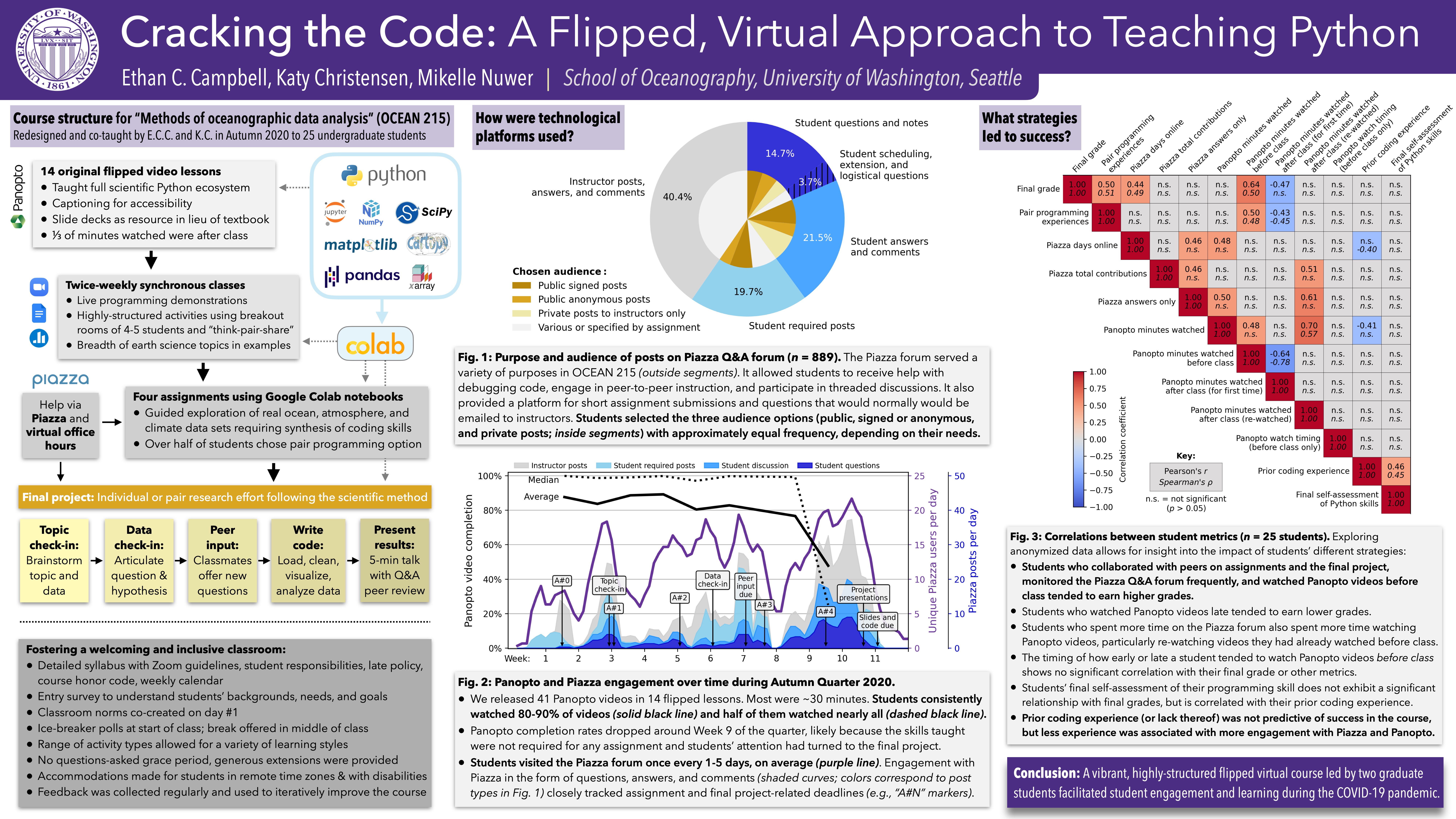Skip to main contentResource added 
We completely redesigned an introductory UW Oceanography data analysis course (OCEAN 215) with the goal of equipping students to engage in scientific inquiry by writing code. Two graduate students co-taught the course to 26 undergraduates in a flipped, virtual format. Cloud-based Google Colab notebooks were used to access the full scientific Python programming ecosystem, which is ubiquitous in STEM disciplines and the data science industry. Highly-structured, collaborative in-class activities were infused with active learning techniques, which have been shown to improve understanding and retention of material (Freeman et al. 2014). Assignments incorporated examples from across the earth sciences, with sufficient scaffolding provided to ensure accessibility from diverse backgrounds. A capstone project guided students through the scientific method in miniature, from forming hypotheses to obtaining data, conducting analyses, exchanging feedback with classmates, and presenting results.
We find that requiring participation in a Piazza question-and-answer board resulted in a vibrant forum featuring frequent peer instruction. Furthermore, half of the students took advantage of pair collaboration opportunities on assignments and the final project. We demonstrate a continuous, high level of student engagement from Piazza and Panopto metrics. Graded assessments and a post-course survey indicate that students achieved proficiency and confidence in analyzing data using programming. This validates our instructional approach and suggests that it may be broadly applicable to introductory programming education in other scientific domains.
Cracking the Code: A Flipped, Virtual Approach To Teaching Python

Full description
Video Presentation
Authors:
- Ethan Campbell, School of Oceanography, UW Seattle
- Katy Christensen, School of Oceanography, UW Seattle
- Mikelle Nuwer, School of Oceanography, UW Seattle
Abstract:
In recent years, the field of oceanography has been transformed by data acquired with "unprecedented volume, velocity, and variety" (Lazowska 2018) from satellites, autonomous platforms, observatories, and climate models. Scientific programming has become essential for manipulating, visualizing, and interpreting these data. Yet few undergraduate oceanography degree programs require computational coursework (Old 2019). This is reflective of a widening gap between earth science undergraduate curricula and the modern-day scientific method and its data analysis pipelines.We completely redesigned an introductory UW Oceanography data analysis course (OCEAN 215) with the goal of equipping students to engage in scientific inquiry by writing code. Two graduate students co-taught the course to 26 undergraduates in a flipped, virtual format. Cloud-based Google Colab notebooks were used to access the full scientific Python programming ecosystem, which is ubiquitous in STEM disciplines and the data science industry. Highly-structured, collaborative in-class activities were infused with active learning techniques, which have been shown to improve understanding and retention of material (Freeman et al. 2014). Assignments incorporated examples from across the earth sciences, with sufficient scaffolding provided to ensure accessibility from diverse backgrounds. A capstone project guided students through the scientific method in miniature, from forming hypotheses to obtaining data, conducting analyses, exchanging feedback with classmates, and presenting results.
We find that requiring participation in a Piazza question-and-answer board resulted in a vibrant forum featuring frequent peer instruction. Furthermore, half of the students took advantage of pair collaboration opportunities on assignments and the final project. We demonstrate a continuous, high level of student engagement from Piazza and Panopto metrics. Graded assessments and a post-course survey indicate that students achieved proficiency and confidence in analyzing data using programming. This validates our instructional approach and suggests that it may be broadly applicable to introductory programming education in other scientific domains.
Poster PDF
View a PDF version of the poster in Google Drive to enlarge the image or download a copy.
Comments
The presenter for this poster will be available to respond to comments during Poster Session 2 on April 20, 3:45-4:30 p.m.Comments
to view and add comments.
Annotations
No one has annotated a text with this resource yet.
- typeImage
- created on
- file formatjpeg
- file size5 MB
- publisherUniversity of Washington
- rights


